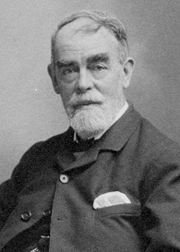On this date in 1835, novelist Samuel Butler (not to be confused with 17th century poet Samuel Butler) was born in England and educated at Cambridge. His father and his grandfather were clergy, and Butler was likewise expected to enter the ministry. While preparing for it, he worked at a school for the poor, where he observed that boys who had been baptized did not differ from those who had not been. He infuriated his father by sharing his growing doubts, and suggesting an alternate career in painting. Butler escaped family ire by emigrating to New Zealand.
On the long voyage, he read Gibbon‘s Decline and Fall of the Roman Empire, which cemented Butler’s rejection of Christianity. He started breeding sheep, read Darwin‘s On the Origin of Species and enthusiastically corresponded with him. When Butler returned to London in 1864, he eventually settled down to a literary career, writing Erewhon (1872), The Fair Haven (1873), Life and Habit (1877), Erewhon Revisited (1901), and The Way of All Flesh (posthumously published,1903). Butler happened upon Lamarck’s work on inheritance and unaccountably turned on Darwin in the late 1870s. Butler’s novels, for the most part not financial successes, were replete with satire of Christianity. The Way of All Flesh salvaged Butler from literary obscurity. (D. 1902)


